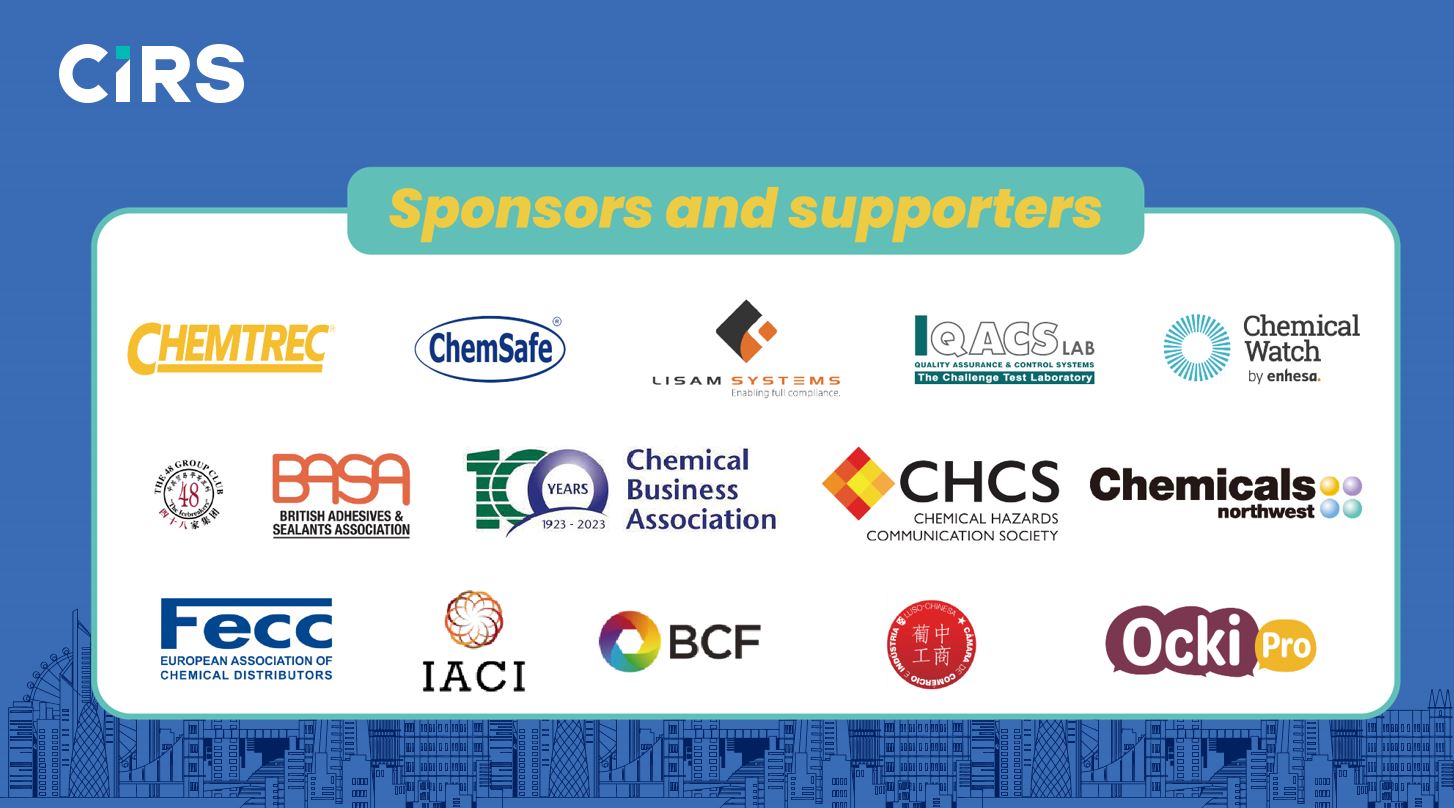
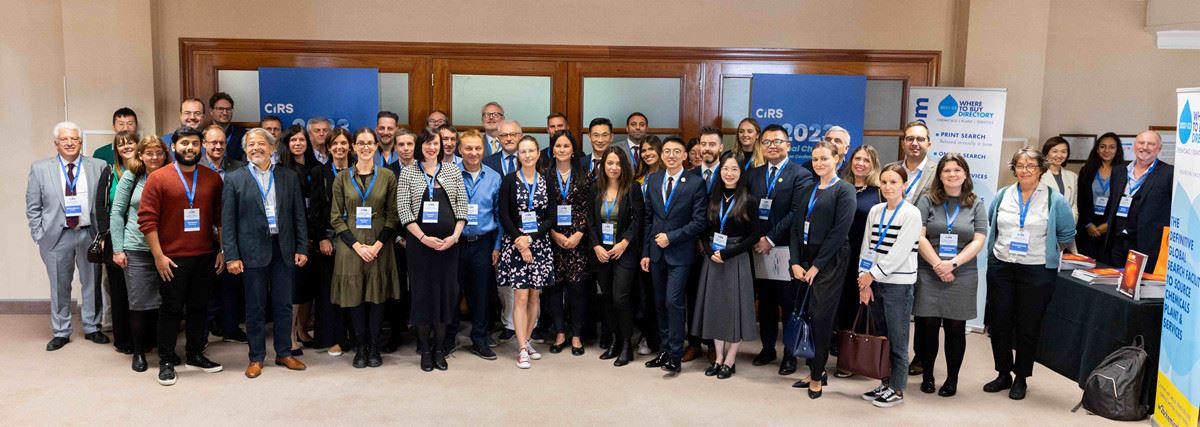
OurGlobal Chemical Regulation Conference, held on October 5, was a resounding success, drawing delegates from 21 countries, and representing a diverse spectrum of the chemicals industry. Supported by five sponsors, nine industry associations, the Irish embassy in London, and the Department of Business and Trade (DBT), this event marks a significant milestone for the CIRS Group, marking our largest European conference to date.
We had a packed schedule that brought together industry experts and our global team to provide nine presentations on the regulatory updates and challenges confronting the global chemical industry. Topics spanned regions such as Europe, the UK, Turkey, South Korea, and China.
Adding to the dynamic mix were two spirited panel discussions: one delved into the prospects of the chemical industry's sustainable development, while the other tackled the supply chain challenges that resonate across the global chemical landscape.
The insightful presentations offered attendees a deeper insight into the diverse regulatory landscapes and issues that prevail in different regions. The day allowed plenty of opportunities for questions, fostering meaningful discussions during sessions and breaks.
The feedback from the delegates has been overwhelmingly positive, serving as a testament to the conference's success. After a short hiatus due to the COVID-19 pandemic, we look forward to resuming these conferences annually. Our aim is to continue uniting professionals from the chemical industry, fostering the exchange of insights and best practices.
Find out more about our chemical conferences here and our cosmetic conferences here.
Register your interest for the conference in 2024 here.
We extend our heartfelt thanks to all our sponsors, supporters, and delegates for contributing to the resounding success of this event. For a comprehensive summary of the presentations, please refer to the details below.
If you attended the event and have yet to receive your copies of the presentations, please contactBryan.Zhou@hfoushi.com.
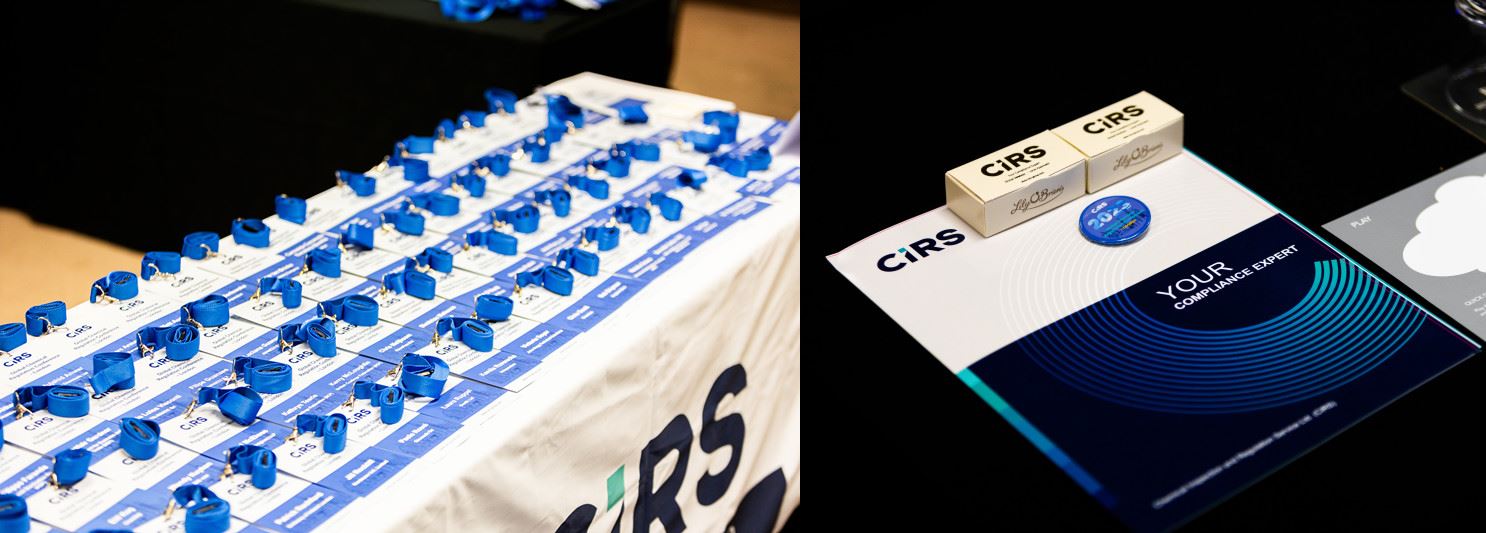
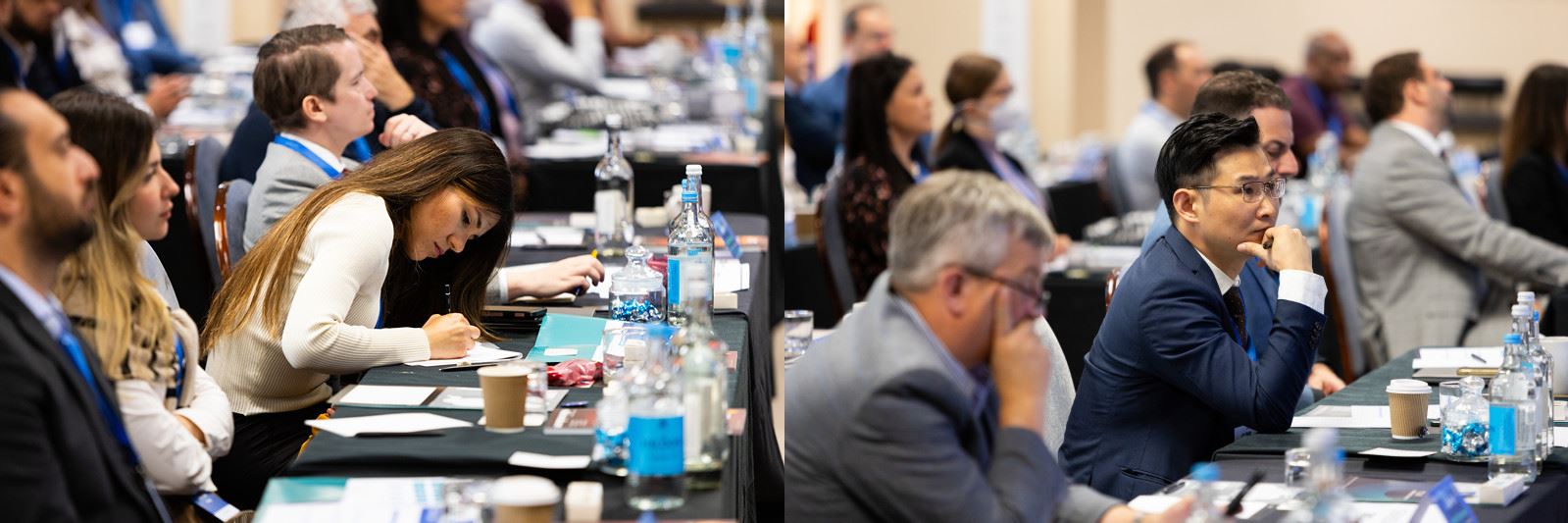
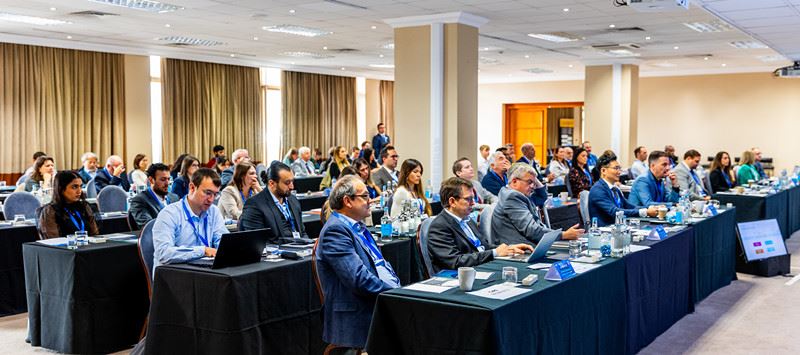

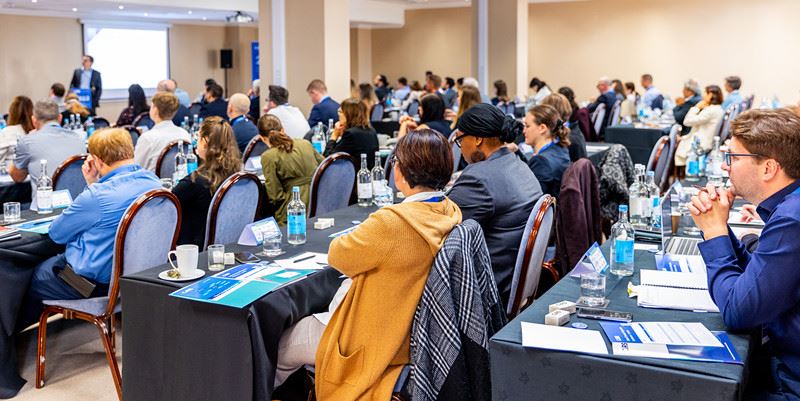
Summary of the presentations
To kick off the conference, Jack Perry Junior, chairman of The 48 Group Club and CEO of London Export Corporation, delivered an insightful opening address. In his remarks, he shed light on the illustrious history of the 48 Group Club, an organization established seven decades ago with the mission of fostering connections and facilitating information sharing among companies looking to strengthen Sino-British relations through business collaboration.
Highlighting the Club's remarkable journey since its first groundbreaking trade agreement with China back in 1953, Jack emphasized its pivotal role in assisting its members, including major players across various industries, including the chemical sector, in navigating the complexities of the Chinese market.
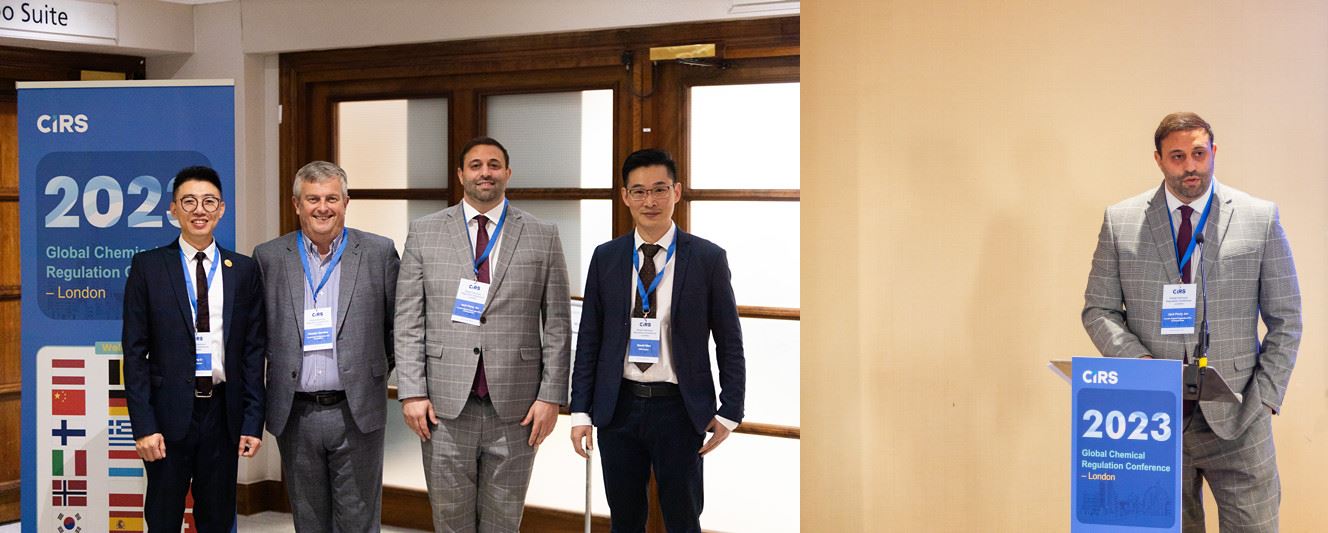
Left to right: Li Xiang, Business Manager – CIRS Europe; Alastair Gardner, trade specialist (chemical) – Department for Business and Trade (DBT), Jack Perry Jnr, chairman – The 48 Group Club; and David Wan, director of CIRS.
Marko Susnik, Senior Advisor to the Austrian Federal Economic Chamber (WKO) and Advisor to the Secretary-General on Chemicals Policy at SMEunited, gave the first presentation with a comprehensive overview of current focal points and emerging trends in EU chemical policy.
His talk covered key aspects such as the Chemicals Strategy for Sustainability (CSS), revisions to CLP, the REACH revision, the safe and sustainable by design (SSbD) framework, as well as issues surrounding biocide regulation. Marko underscored the rapid pace at which policies and legislation pertaining to chemicals are evolving, a phenomenon marked by the growing complexity and cost associated with chemical management.
Furthermore, he pinpointed several areas where bottlenecks are either already evident or poised to become critical challenges, including resource constraints within authorities, testing laboratory capacity, and enforcement mechanisms.

Sebastien Chaigneau, EHS Director at the BMI Group, shared the Group's commitment to sustainability and positive impact through the 3Ps: planet, people, and profit.
He first emphasized the Group's approach to sustainability, embedding it in their business operations to reduce environmental impact. Sebastien cited initiatives like assessing greenhouse gas (GHG) emissions both upstream and downstream from BMI Group.
Next, he discussed their dedication to fostering thriving employees through healthy relationships and opportunities for personal growth. He also highlighted the transition from reactive to predictive strategies in health, safety, and environment (HSE) management, ensuring HSE is a priority in all discussions.
Lastly, he underlined their mission to create products that actively promote goodness and encourage circular practices. Notably, their focus on solar power, cleaner air initiatives, and the development of lightweight, sustainable concrete tiles.

Gunther Van Kerckhove, the Head of Health and Safety at OCSiAl Group, presented a compelling case study on the Group's regulatory experiences with single-wall carbon nanotubes (SWCNTs). As the world's leading SWCNT producer, accounting for a remarkable 95% of the market share and widely utilized across various industries, their insights are invaluable.
He delved into the meticulous research and studies undertaken by the group to substantiate the absence of risks associated with SWCNT exposure. The comprehensive body of evidence from these studies demonstrates the absence of any toxic effects, all of which have been executed in compliance with relevant OECD test guidelines.
Furthermore, Gunther highlighted ongoing exposure monitoring studies, one focusing on recycling tire treads and another on recycling LiBs, showcasing the group's proactive approach to ensuring the safety and sustainability of their products.

Michel Hemberg, CEO of Lisam Systems, delivered an informative session on the latest EU CLP updates. He began with a concise overview of CLP endpoints and classification criteria, covering concentration thresholds, physical hazards, and health hazards.
Next, he delved into the CLP Delegated Act (EU 2023/707) published on December 19, 2022, which introduced several new classifications. These included endocrine disruptors for human health and the environment, PBT and vPvB substances and mixtures, as well as PMT and vPvM substances and mixtures. Michel provided specific concentration limit examples and highlighted important deadlines.
Concluding his presentation, Michel offered a brief glimpse into the tenth revised edition of the UN Globally Harmonized System of Classification and Labelling of Chemicals (GHS), released on July 27, 2023. He outlined the key changes compared to the ninth edition.
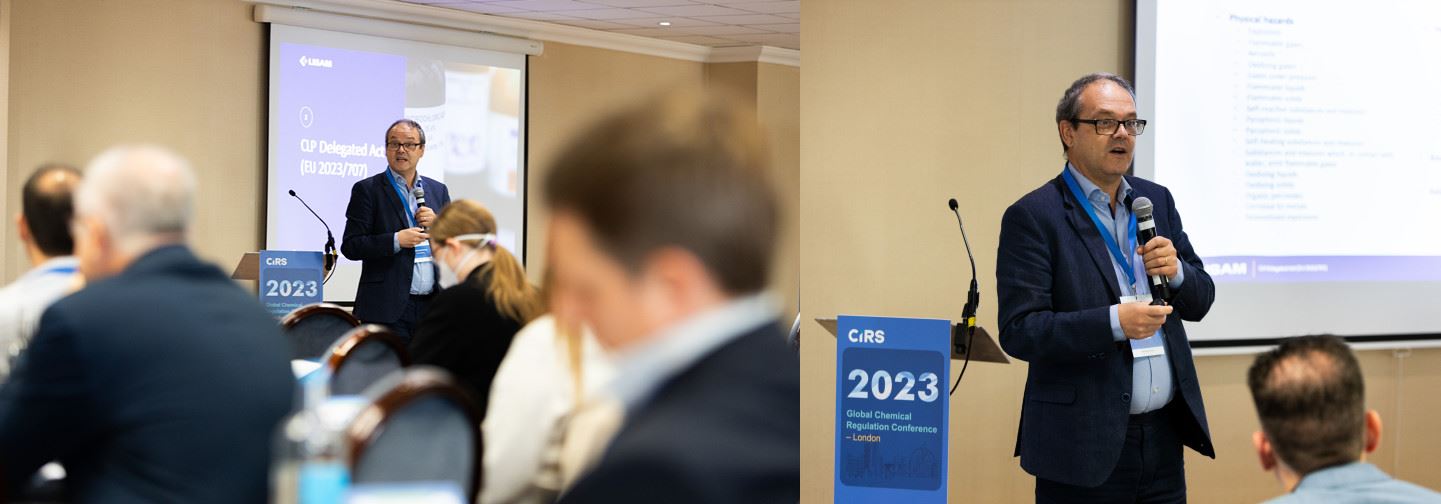
In the first post-lunch session Alastair Gardner, trade specialist (chemical) – Department for Business and Trade (DBT) gave an overview of global export and trade opportunities for UK companies. He provided a brief summary of the chemicals team at DBT and the work that it does in the UK and globally to assess new export markets for the chemical industry.
He gave information on how the DBT helps businesses overcome barriers to export by providing services such as free and impartial advice, webinars, and online learning tools as well as access to trade shows, international research, and funding.

In a joint presentation addressing South Korean chemical regulations, Junho Lee, director of CIRS Korea, initiated the discussion with an insightful overview of the ongoing advancements in K-REACH notifications and registrations for both new and existing chemicals.
He then delved into transported isolated intermediates (TII) registration, providing clear definitions and outlining the associated challenges. Junho then focused on the 100-1,000-ton registration deadline, which must be completed by December 31, 2024. Notably, he underscored that co-registrants are poised to submit their registrations only after the lead registrant (LR) has finalized theirs, which can be expected to take one to two months with The National Institute of Environmental Research (NIER). The LR will require around three months with NIER.
He concluded his presentation by focusing on the current situation of authorization in South Korea, with the first public consultation on the first designation of substances for the Candidate List concluding in February this year. He laid out the seven stages of the procedure to designate Substances subject to Authorization in South Korea, noting that the country is currently in stage one.
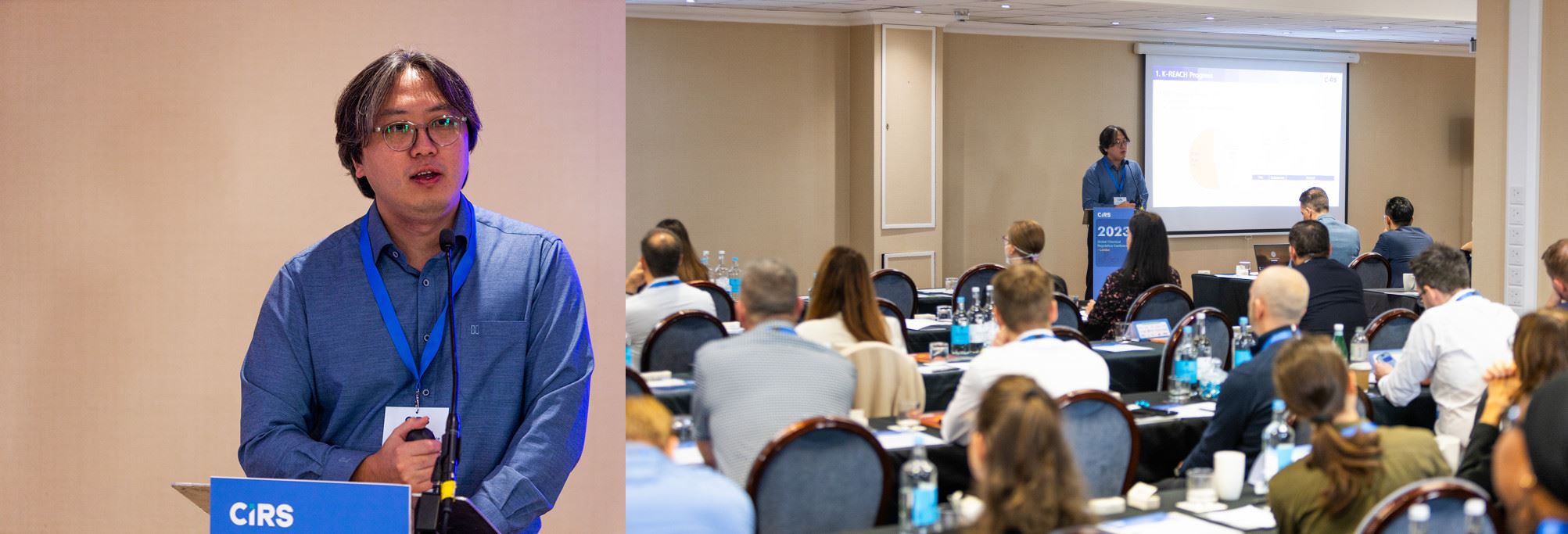
Continuing the presentation, SeoWon Kim, chief manager of CIRS Korea delved into the current progress of the Consumer Chemical Products and Biocides Safety Act (known as K-BPR) which regulates consumer chemical products, biocidal products and biocide-treated articles.
She provided an intricate examination of the various grace periods associated with K-BPR, notably emphasizing the impending deadline for Group 2 categories, encompassing wood preservatives, control of other vertebrates, and control of other invertebrates, slated for December 31, 2024. Furthermore, she offered a comprehensive breakdown of the 48 existing active substances within Group I that secured authorization in 2022, along with the requisite disclosure requirements.
Concluding her presentation, SeoWon shed light on the ongoing dialogue held by the Ministry of Environment with industry stakeholders, an annual endeavor aimed at identifying chemical products warranting regulation through comprehensive risk assessments. This process continually expands the scope of regulated products to ensure safety and compliance.
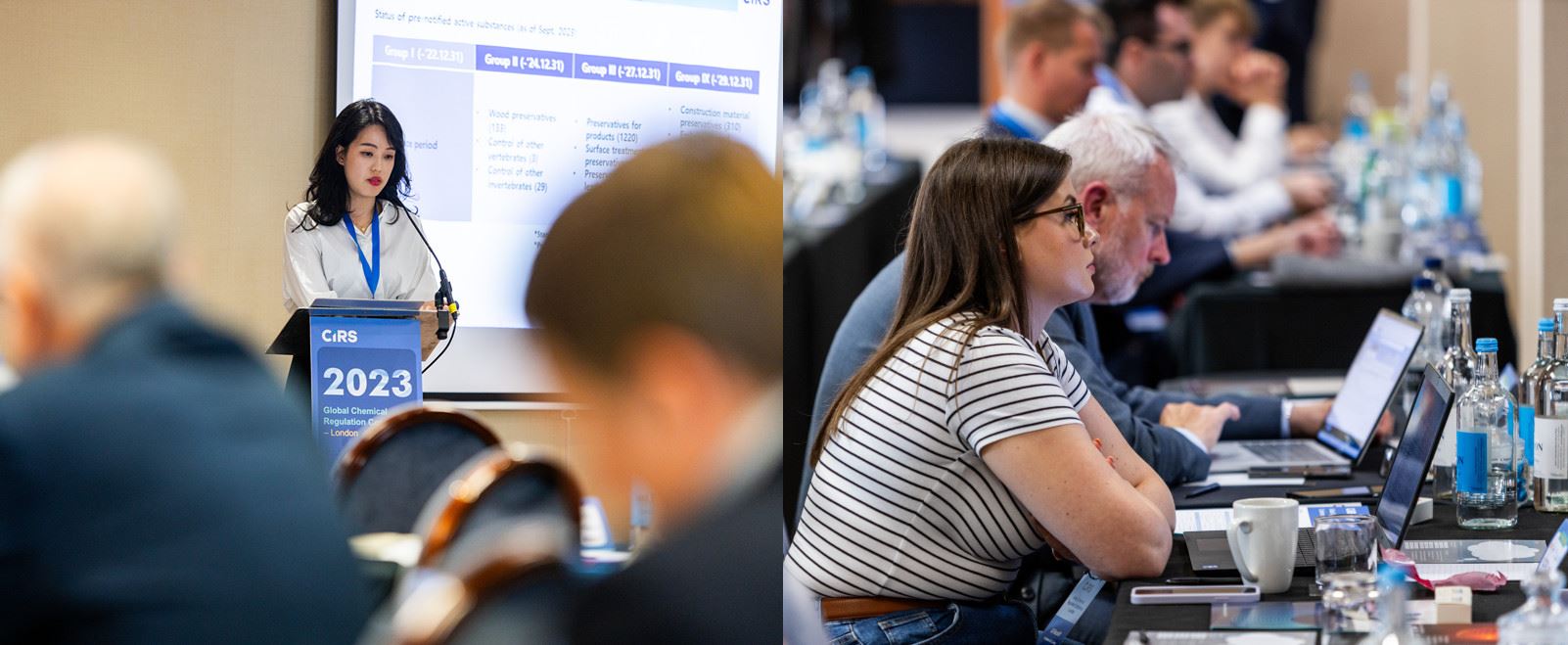
Dean Winder, senior regulatory consultant at CIRS Europe, delivered an insightful exploration of chemical management regulations in China. He began with a concise overview of regulations governing new and existing chemical substances and the Globally Harmonized System (GHS) for Classification and Labelling of Chemicals.
He then delved into MEE Order 12 and the associated challenges, such as stringent approval criteria for confidential business information (CBI) applications, the absence of standard test methods for polymer stability assessment, and a lack of guidance for the socio-economic benefit analysis report.
Dean then shifted focus to hazardous chemicals, highlighting the innovative "one enterprise, one product, one code" QR code system. This system mandates a unique QR code for each hazardous chemical in every enterprise, serving as a safety information identifier. This code can be affixed to the packaging, including the outer packaging, and integrated into the chemical safety label.
Concluding his presentation, Dean briefly addressed Chinese GHS regulations, which are presently aligned with the fourth revision of the GHS. He noted that the Ministry of Industry and Information Technology (MIIT) is in the process of replacing the current regulation GB 13690-2009 with GB 30000.1, aligning Chinese chemical classifications with UN GHS Rev. 8 after its implementation.
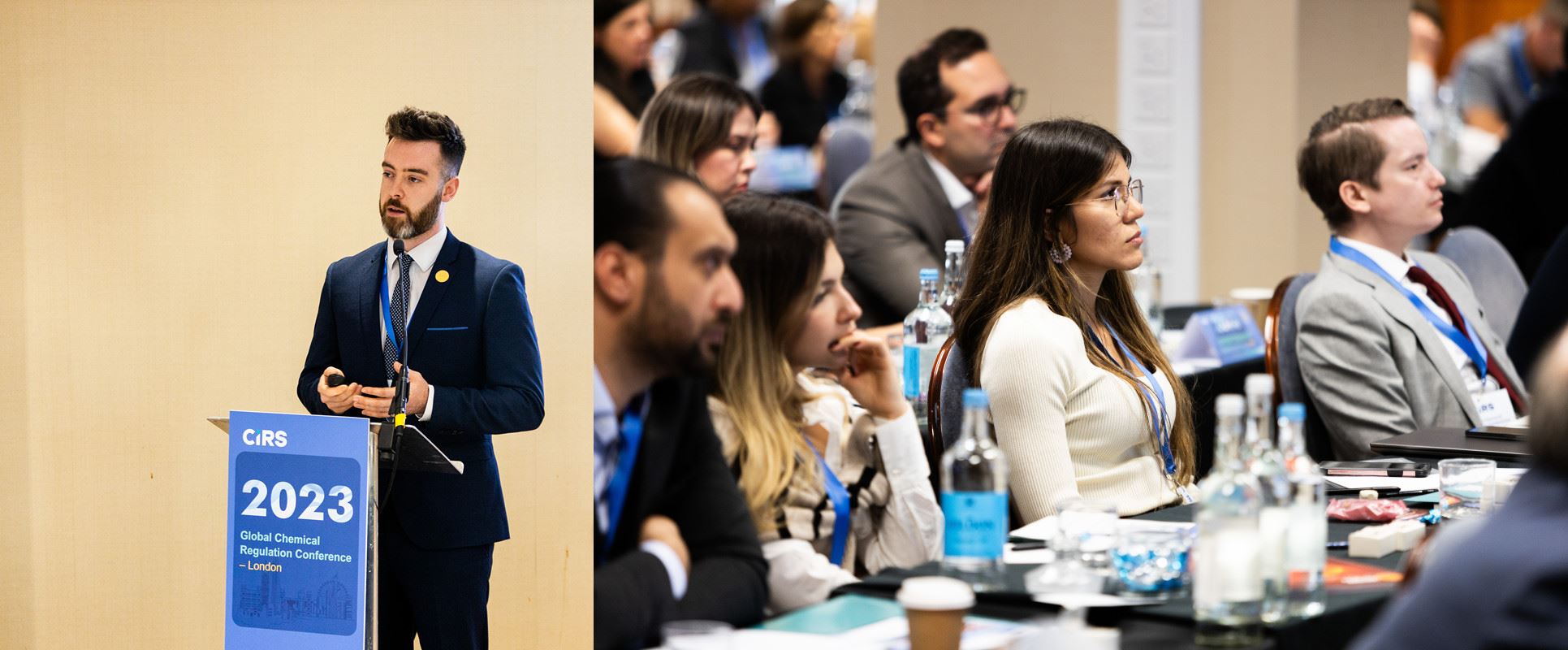
Ian Cranshaw, head of international trade and regions – Chemical Industries Association (CIA) presented an overview of challenges facing UK chemicals companies.
He highlighted that CIA member companies have described energy costs, skills shortages, labor cost increases, and raw material price increases as the key critical challenges they will face over the next 12 months. He provided detailed background and figures into each of the issues.
Ian also revealed that DEFRA will be publishing a consultation later this year. DEFRA says that industry will be happy that the proposal does not require companies to pay additional costs for substances registered in the EU that are on the database. However, Ian noted it is not yet clear how DEFRA will deliver this.

Elif Koç, Managing Partner at Chemleg, delivered a comprehensive presentation on preparing for the KKDIK (Turkey REACH) registration deadline. She offered valuable insights into KKDIK, outlining both its parallels and distinctions from the EU REACH framework.
While the pre-registration deadline has been extended until December 31, 2023, Elif observed that only 13% of substance registrations have been completed, making an additional extension highly probable. The exact duration of this extension remains uncertain, with discussions ranging from a three-year to a six-year extension.
Elif also shed light on some of the challenges faced under KKDIK, including the time-consuming nature of negotiations with data owners and the lack of clear guidance from regulatory authorities regarding the postponement.

Panel discussions
The conference also featured two dynamic panel discussions moderated by Emma Chynoweth, co-founder of Ocki. The first panel delved into sustainable development in the chemical industry and included Junho Lee, Greta Waissi – vice president and head of regulatory affairs at NordShield, Sebastien Chaigneau, and Marko Susnik.
Marko emphasized the significant role of SMEs in educating consumers and cautioned against losing this educational element if SMEs are driven out due to cost and capacity constraints in implementing sustainable practices. Greta stressed the importance of alliances and expressed concerns about innovation if potential bans on crucial chemicals under REACH go ahead without viable alternatives.
Junho pointed out that many regions in Asia, like South Korea, are not yet aligned with the EU's current standards and are much further behind in their regulatory journey so not yet ready to tackle sustainability. He highlighted the challenges faced by SMEs and called for large companies to lead in sustainability, thereby having a trickle-down effect on smaller businesses.
Sebastien emphasized using marketing departments to determine consumer interests, which can drive demand for more sustainability information. He stressed the need for a deliberate focus on sustainability, rather than maintaining the status quo.
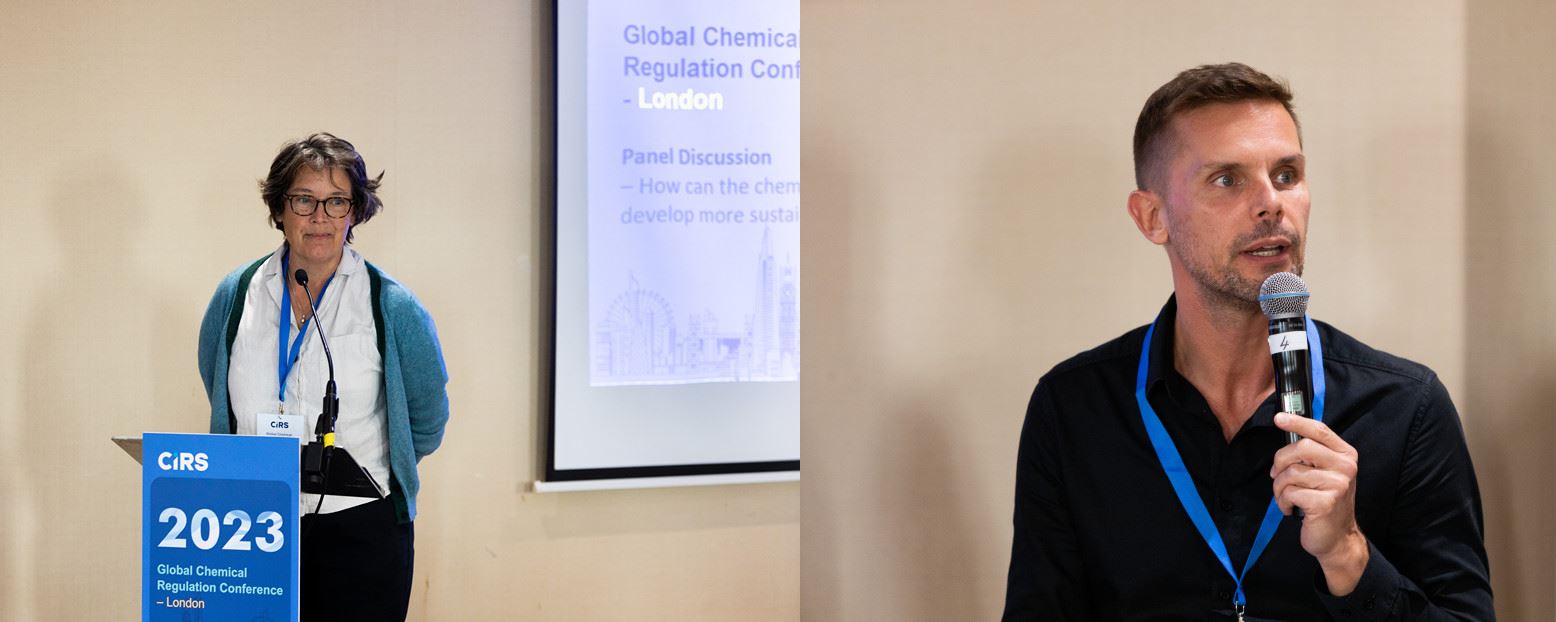
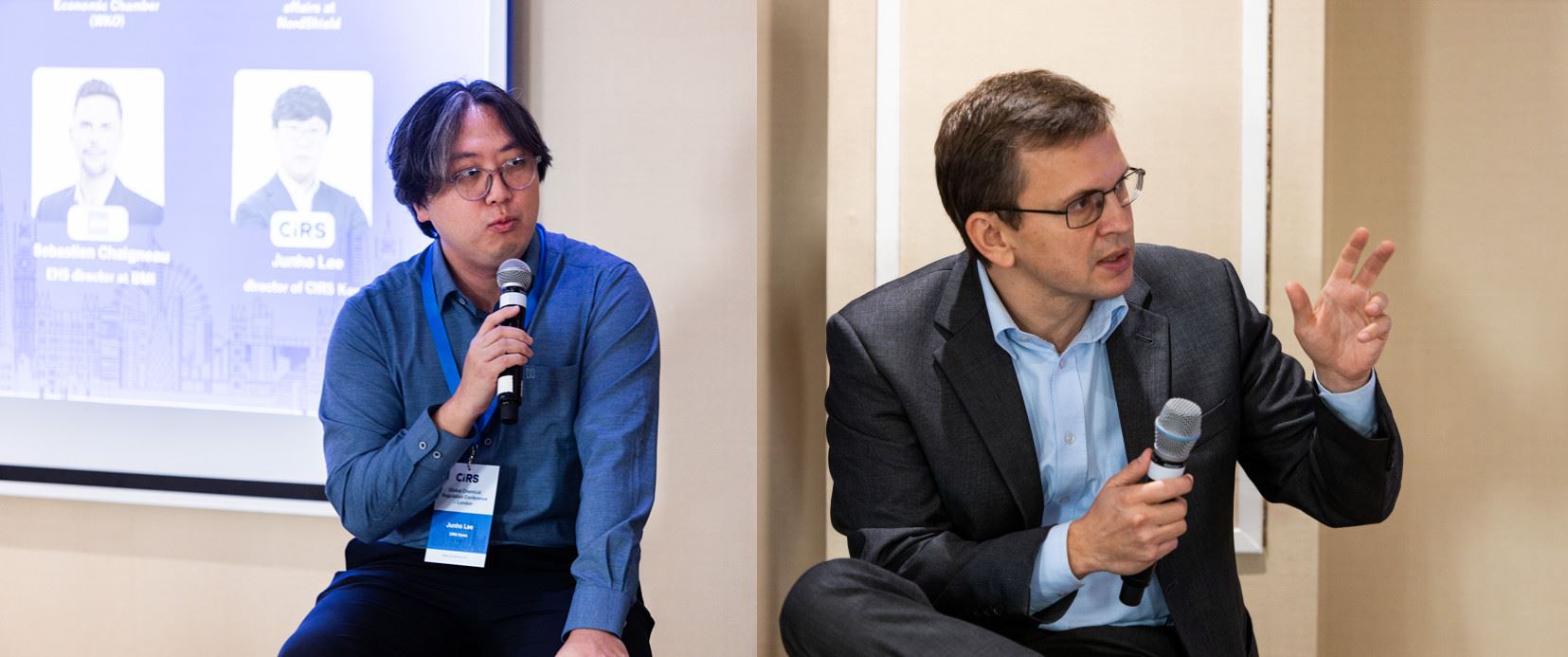
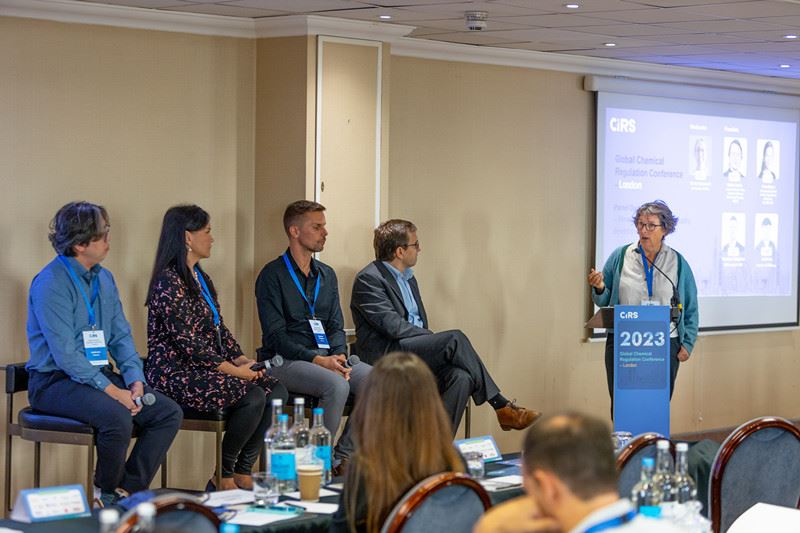
From left to right: Junho Lee, director – CIRS Korea; Greta Waissi, vice president and head of regulatory affairs – NordShield; Sebastien Chaigneau, EHS director – BMI Group; Marko Susnik, senior advisor – Austrian Federal Economic Chamber (WKO); and Emma Chynoweth, co-founder – Ocki.
The second panel discussion revolved around supply chain challenges in the global chemical industry and featured Ian Cranshaw, Alastair Gardner, Antonio Conto – Founder of Chemsafe, and Michel Hemberg.
In response to Emma's query about supply chain pinch points, Alastair highlighted that often, inaccurately filled forms can lead to shipment delays and problems across the global supply chain. Ian emphasized regulatory barriers and cited India's recent request for CAS numbers for all imports, raising concerns about intellectual property issues linked to formula disclosure. He underscored the industry's desire for clear and concise regulation communication.
Antonio stressed the need for strategic global trade management, acknowledging the inherent complexities. He emphasized the importance of a "safe by design" approach and the growing complexity and scientific nature of regulations. Antonio also mentioned the need for investment in skilled professionals, although the industry faces a skills shortage. Ian noted that while there is a skill shortage, young professionals increasingly consider sustainability and other company aspirations and goals when selecting employers.
Michel brought up the topic of digitalization and its role in maintaining compliance within global strategies. However, he noted that digitalizing Safety Data Sheets (SDSs) remains a complex challenge for the industry that must be addressed.
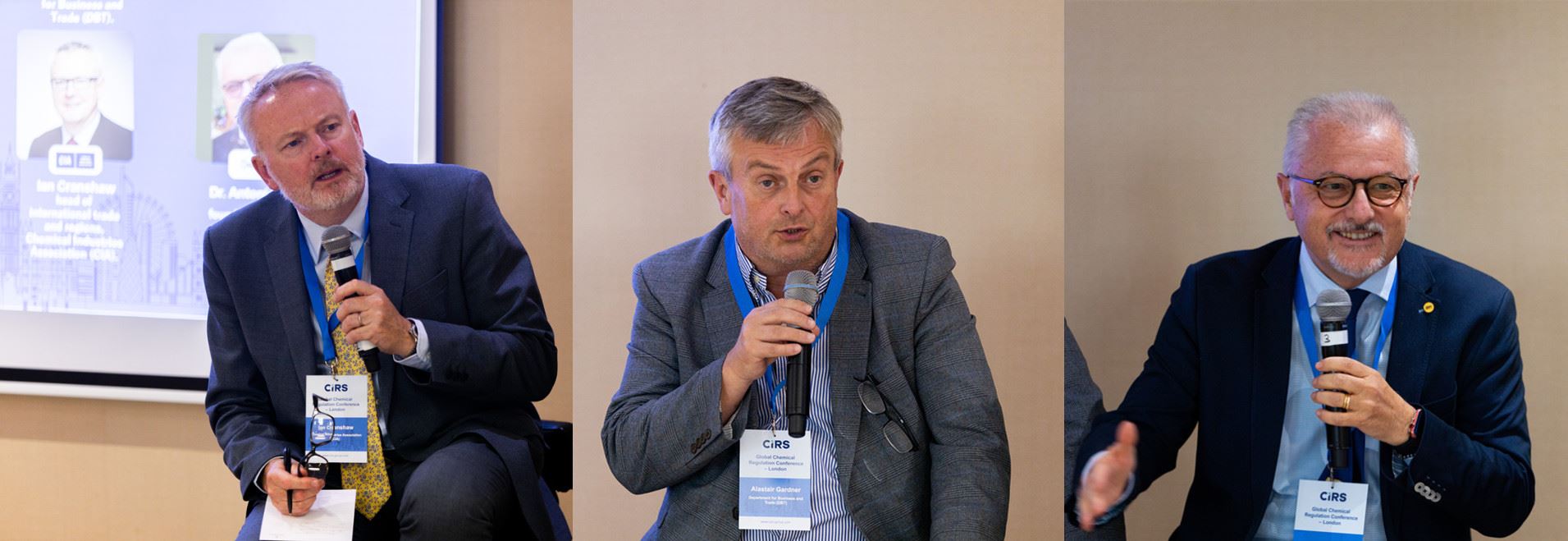
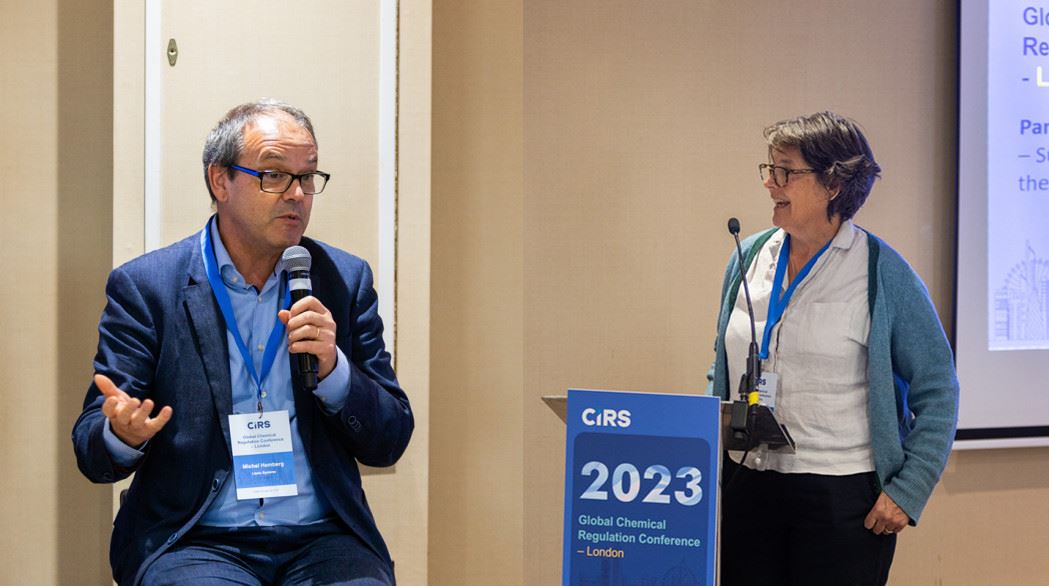
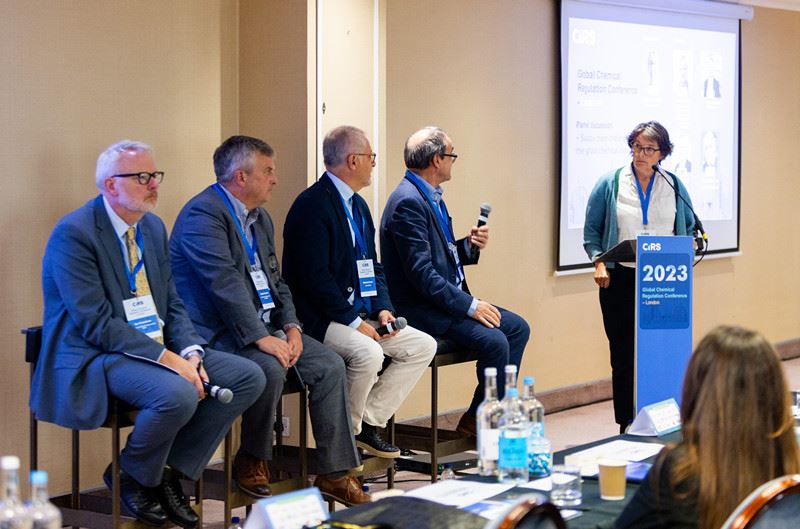
From left to right: Ian Cranshaw, head of international trade and regions – Chemical Industries Association (CIA); Alastair Gardner, trade specialist (chemical) –Department for Business and Trade (DBT); Antonio Conto, founder – Chemsafe; Michel Hemberg, CEO – Lisam Systems; and Emma Chynoweth, co-founder – Ocki.
We would like to thank all our sponsors and supporters, as well as the delegates, for making this such a successful event.
